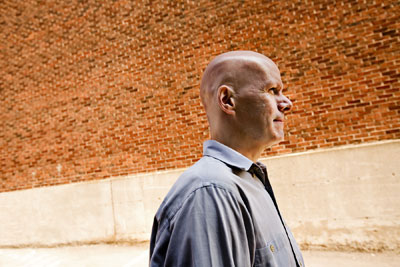
Liam Durcan was probably the only neurologist invited to the Blue Metropolis International Literary Festival in April.
Claudio Calligaris
Profile
Liam Durcan: Straddling the worlds of art and science
A few steps south of the main entrance to the Montreal Neurological Institute on University Avenue, a large-scale inscription on the building's stone facade quotes MNI founder Wilder Penfield: "The problem of neurology is to understand man himself."
This lapidary pronouncement seems especially àpropos in the case of Liam Durcan, a clinical neurologist who has been seeing patients with brain disorders at the MNI since 1994 and who lends considerable credence to Penfield's assertion that a neurologist's specialized study of the brain can go hand in hand with a wider contemplation of the human condition.
After all, Durcan, who is also professor in the Faculty of Medicine, recently did something rather unusual for a neurologist: he wrote a critically acclaimed novel.
Published in April by McClelland & Stewart, García's Heart, Durcan's first novel, has earned him enthusiastic recognition from the Canadian literary community, including high praise from critics in the Gazette, the Toronto Star and the Globe and Mail. García's Heart tells the story of a Montreal-born, Boston-based neurologist who travels to The Hague in order to bear painful witness to the war crimes trial of his friend and mentor, Hernan García.
"I've always been a reader and I've always loved certain types of fiction. I think that's probably where it comes from—you want to mimic what you like," said Durcan, an amiable and soft-spoken Winnipeg native. The 42-year-old neurologist said he took up creative writing seriously only about five or six years ago, after attending a workshop at the Quebec Writer's Federation, where he was encouraged to start submitting his work to literary journals.
Although he drew on his neurological expertise for García's Heart and acknowledges that his medical practice and literary activity influence each other in subtle ways, Durcan said he generally prefers to keep separate the two dimensions of his dual-profession life.
He made a point of doing so, he said, in his first book, the 2004 short story collection A Short Journey by Car, which has nothing to do with medicine and which the Globe and Mail named one of its top 100 books of the year. His second novel, now in progress, will likely reflect his fascination with architecture, he said.
"Medicine is wonderful and it provides all sorts of analogies to explore and a natural dramatic tension in a workplace like this," Durcan said, gesturing to his MNI environs, "but I think I'd like to be in the category of writer, not in that category of doctor-writer because I think it can be a bit of a ghetto."
"I like to think of myself as someone who's very curious about the world, and curious beyond medicine."
Amazingly, Durcan wrote the 378-page García's Heart in a mere nine months, all the while fulfilling his regular duties as a full-time MNI doctor, not to mention as father to two children, aged four and six. He said he usually writes between nine and 11:30 at night, after the kids have gone to bed.
"I'm almost sheepish to admit that it didn't take that long to write. I've been lucky," he said, adding he found having limited time to work proved surprisingly beneficial to his artistic productivity. "I think you get into a habit of just sitting down and writing. And writing doesn't become this mysterious thing. I've never been faced with writer's block for that very reason."
Durcan said he refuses to privilege art over science as a means of understanding the world, or vice versa, believing a fruitful complementarity can exist between the two.
"When I finished my [neurological] training, I was 27; I had excellent technical training and had very humane mentors and teachers. Yet I felt ill-prepared, like I had very specific technical training and not much else. I felt like I needed to go get a liberal arts degree after that to figure out how to apply it. And maybe writing is that education."

